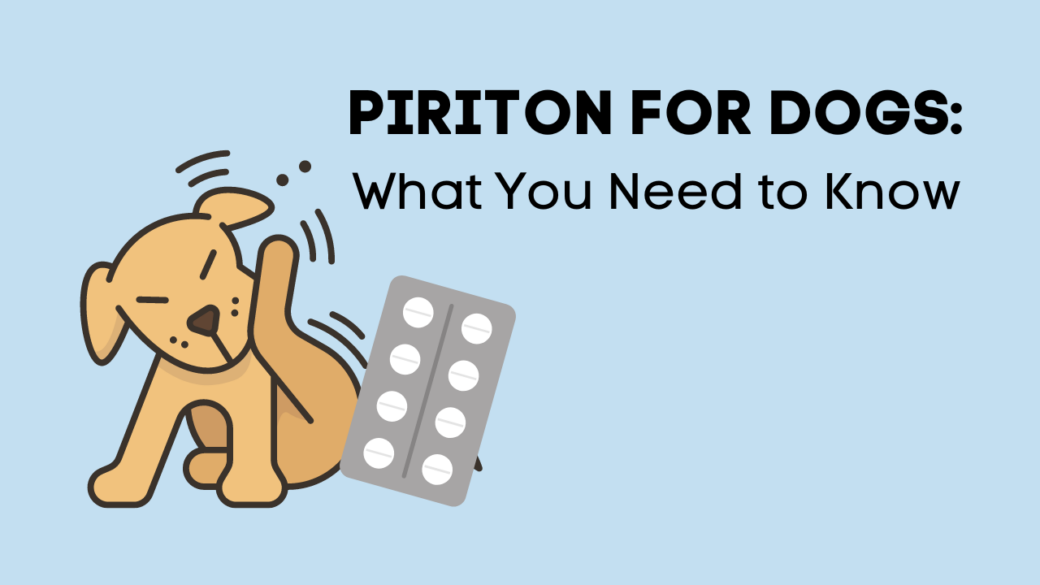Piriton is a popular antihistamine used by people as a form of allergy relief. It is primarily used to help with allergic reactions, hay fever, insect bites, and other conditions; dogs also experience some of these issues.
Although dogs can be given Piriton, this should only happen after seeking advice from a professional vet. There are potential side effects that dogs can experience from taking Piriton, which means using the correct dosage is crucial.
So, with that in mind, is Piriton for dogs safe?
Table of Contents
What is Piriton?
Piriton, which includes the active ingredient known as chlorpheniramine maleate, is a drowsy antihistamine. This means that it can make someone feel more sleepy than other medications. It works to prevent histamine from reacting negatively to allergens, which can then cause the immune system to go into overdrive; this is known as an allergic reaction.
As well as common allergic conditions, Piriton can also be used to treat conjunctivitis, eczema, and hives caused by chickenpox. It can be used to treat coughs and colds when mixed with other medicines.
This antihistamine, which can come as tablets or liquid, can be given as a prescription or bought over the counter. On the NHS website, it is stated that Piriton can be taken by “most adults.” It should not be given to children below the age of six. If children require this type of medication, they should only be given Piriton if a doctor has prescribed it.
Is Piriton Safe for Dogs?
Like many medications created for humans, veterinary advice should be sought out before using human medicine on animals. A certain level of caution should be taken before giving Piriton to your dog; the correct dosage must be given to ensure they do not overdose.
If you do seek veterinary advice on your dog’s potential allergies, then the vet will discuss the dose to give. This might depend on the type of condition your dog suffers from, such as food allergies, flea bites, hay fever, other environmental allergies, etc.
Dogs can show the following allergy symptoms:
- Coughing and/or sneezing
- Scratching more often
- Irritated skin
- Chewing their paws
- Redness around eyes and ears
- Ear infections
- Hair loss
- Dog’s skin swelling
Vets will take into account your dog’s age, weight, and any existing medical conditions when prescribing medication such as Piriton for your dog. If your vet does recommend Piriton to treat dog allergies, it is crucial to follow the dosage and frequency of medication carefully.
The only way to obtain Piriton for your pet is through a vet’s prescription; it cannot be bought in a pharmacy. If you are wondering, “Can pharmacists legally sell Piriton for dogs?” the answer is no. It is not licensed for use in animals.
When Should You Give Dogs Piriton?
Dogs should not be given Piriton without consulting a vet first. If your dog suffers from allergic reactions, then this should be discussed with a vet, who will then be able to advise you on the right action to take.
Does Piriton Cause Side Effects in Dogs?
Yes, when given Piriton tablets, a dog may experience certain side effects. These can be similar to the adverse reactions humans experience when taking this specific antihistamine.
What are the Side Effects of Piriton for Dogs?
There are six main side effects dogs might experience from taking Piriton. Additionally, your dog might experience a few side effects not listed below; how your dog reacts to Piriton will differ from others, just like humans.
The main side effects are shown:
Drowsiness
This is the most common side effect. As Piriton is commonly known as a drowsy antihistamine, it actually contains the compound that causes drowsiness. If your dog is sleepy after taking Piriton, this can be normal for most dogs; however, it is important to ensure your pet is comfortable.
In the wrong dose, Piriton can work as a sedative, which can be dangerous. This can become an issue when too much is given, and the dog will struggle to stay awake. If given to a small dog, like Chihuahuas, Yorkshire Terries, and West Highland Terriers, measuring out the correct dosage is essential to avoid heavy sedation. Medical attention will be required if a dog is given too much Piriton.

Diarrhea or Constipation
Piriton can cause dogs to suffer from diarrhea. The opposite can happen, too; dogs can become constipated after taking Piriton. It is essential to speak to your vet if your pet is displaying any signs of diarrhea or constipation for an extended period.
Also, ensure they have plenty of water if they experience either of these symptoms; diarrhea, especially, can cause dogs to become dehydrated quickly.
Nausea and Vomiting
After giving a dog Piriton, it is possible for the dog to become nauseous and vomit. This is a common initial reaction, but stop giving Piriton if the issue persists and contact your vet. Some people believe that the chemicals of antihistamines can block receptors in the part of the brain that creates nausea.
Dogs suffering from an upset stomach might require a restricted diet for a short time; this is likely to be advised by the vet.
Loss of Appetite
Due to nausea and vomiting, the loss of appetite or a change of eating habits is a secondary side effect of Piriton. Dogs are less likely to eat if their stomach is upset. This can be concerning for dog owners, but it will often pass; if this issue persists, contact a vet for advice.
Excessive Thirst
Dogs can experience dry mouth after taking this particular antihistamine. This can cause them to drink a lot more than they normally would. To help with this, ensure fresh water is available at all times and is easy to access.
If you find that your dog is not drinking more water, you can add some kind of stock to their food or feed them icecubes to increase their water intake.
Difficulty Urinating
Antihistamines can sometimes cause tightening around the urethra, which might cause the dog to strain when trying to urinate.
Other Potential Side Effects
The following side effects are listed on the NHS website for people to be aware of; there is a chance that dogs might also experience them.
- Dizziness
- Headaches
- Blurred vision
How Much Piriton Should Dogs Be Given?
As discussed previously, giving dogs Piriton should be done cautiously. The proper dosage depends on several factors, including the dog’s body weight, size, and breed. It should be measured carefully to prevent dogs from experiencing the side effects listed in this article. Remember, the wrong dosage can make dogs drowsy, sick, and uncomfortable, and it can cause other side effects.
The dosages listed below are for guidance only; a veterinary surgeon has not supplied these. For the correct Piriton dose, please seek advice from your dog’s vet.
Piriton Dosage
If giving your dog Piriton, it is important to know the correct dosage. This mostly depends on the body weight of the individual dog. Although Piriton does come in liquid form, it is most commonly used as a tablet dose.
Piriton Tablets
Primarily, the guidance states that a dose of 0.2mg should be given per kilogram of the dog’s weight. For example, a small dog weighing 5kg should be given 1mg of Piriton. Again, the correct dosage should be advised by a professional veterinary surgeon.

Small Dogs
Small dogs weighing between 5 to 11kg should receive 1 to 2.2mg of Piriton.
Medium Dogs
Medium-sized dogs weighing between 12 to 44kg should receive 2.4 to 8.8mg.
Large Dogs
Larger dogs weighing between 45 to 70kg should receive 9 to 14mg of Piriton Tablets.
Are Other Antihistamines Safe for Dogs?
At this time, there are no antihistamines made solely for dogs. However, other antihistamines can be given to dogs; the most common is Benadryl, which is another over-the-counter medication.
Benadryl comes as a syrup or liquid, tablets, and capsules. It contains the active ingredient diphenhydramine hydrochloride, which is similar to Piriton. Hence, if a vet prescribes Benadryl, it can be used in the same manner as Piriton.
The dosage is the same as Piriton at 0.2mg per kilogram. It would be wise to discuss any concerns or questions with a vet if this is prescribed.
To Sum Up
Although Piriton for dogs is generally safe, you should only give your dog Piriton if advised by a veterinary surgeon. The vet will help you to determine the correct dosage and will discuss any potential side effects.
This article has detailed six of the main side effects that dogs might experience when taking Piriton, such as drowsiness, diarrhoea or constipation, nausea and vomiting, and more. All of these adverse reactions can worry dog owners, but they will often pass within a day or two; if they do not, it is important to get veterinary advice.
If a vet prescribes your dog Piriton, this will hopefully ease some of the discomforts from allergies.
Disclaimer: This article is for informational purposes only and should not be used as a substitute for professional veterinary advice.

